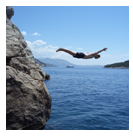题目内容
Our new foreign students are going to arrive very soon, and here are some ways to communicate with them politely.
How close do you stand when you talk to a friend? You can stand close to people in the Middle East but don’t stand too close to North Americans! Give them more personal space.
Do you know How to touch people correctly? Chinese girls often walk arm in arm with their friends. South Americans sometimes hold your arm when they talk to you, so you can’t move away! But in Britain many people don’t like other people to touch them at all.
Do you look at people when you talk? In some places, it isn’t polite to look at people when you talk, but in other countries it isn’t polite to look somewhere else. In Britain and the US, people usually look at each other when they talk.
And how do you say goodbye? That’s easy, wave(挥手) to say goodbye. But be careful! In Greece, it’s not at all polite! In fact, it’s very rude!
根据短文内容,选择正确答案。(5分)
【小题1】From the passage, we should give more personal space.
| A.people in the Middle East | B.people in North America |
| C.people in the South America | D.people in North China |
| A.触碰 | B.打击 | C.感动 | D.震撼 |
| A.America | B.Japan |
| C.Britain | D.Greece |
| A.Two | B.Three |
| C.Four | D.Five |
| A.Saying goodbye | B.Touching people |
| C.Looking at people | D.communicating politely |
【小题1】B
【小题2】A
【小题3】D
【小题4】C
【小题5】D
解析

 高中必刷题系列答案
高中必刷题系列答案Reading is the key to school success, and like any skill, it takes practice. A child learns to walk by practicing until he no longer has to think about how to put one foot in front of the other. An excellent sportsman practices until he can play quickly, correctly and without thinking.
Educators (教育家) call it "automaticity (自动性)”.
A child learns to read by sounding out the letters and finding the meaning of the words. With more and more practice, he stumbles less and less. As a result, he can read by the phrases and soon by sentences. With automaticity, he doesn't have to think about the meaning of words, so that he can give all his attention to the meaning of the text.
It can begin as early as first grade. In a recent study of children in Illinois schools, Alan Rossman of Northwestern University found that automatic readers in the first grade not only read almost three times as fast as the others, but also got better results in exams.
According to Rossman, the key to automaticity is the amount of time a child spends reading, not his IQ. Any child who spends at least 3.5 t0 4 hours a week reading books, magazines or newspapers will probably reach automaticity. It can happen if a child turns off TV just one night for reading at home.
You can test yourself by reading something new which is suitable for your level. If you read aloud with expression, with a sense of the meaning of the sentences, you probably are an automatic reader. If you read brokenly, one word at a time, without expression or meaning, you need more practice.
【小题1】"Reading is the key to school success" means that reading_______.
| A.helps school develop faster |
| B.is a key to a successful school |
| C.helps students go to a key school |
| D.can improve students' learning results |
| A.know how to read the words |
| B.pay attention to the meaning of the text instead of the words |
| C.read by themselves without any help |
| D.do not have to think while reading |
| A.结结巴巴地读 | B.全神贯注地读 |
| C.心不在焉地读 | D.声情并茂地读 |
| A.IQ is the Key- to the Automaticity |
| B.TV is Bad for Children's Reading |
| C.Automaticity Needs a Lot of Practice |
| D.Automatic Readers Must Be Successful |
In junior high school in America, kids study English, writing, math, science, biology, music and art.
At 12 o’clock, the students eat lunch at school. They have meat, vegetables, fruit, bread and a drink, but they like hot dogs and hamburgers best. American kids like sugar (糖), and after the meal they can have a small piece of cake.
Students sleep (睡觉) for a short time after lunch. They begin classes at 1:30 in the afternoon. They go to school on weekdays and have classes for six hours every day and then return home.
Parents let their kids play or watch TV until dinner at 6:00 p. m. After dinner, they do their homework. Sometimes kids and their parents have a family activity after dinner.
根据短文内容,选择正确答案。
【小题1】. What do the students like best for lunch at school?
| A.Meat and fruit. | B.Hot dogs and hamburgers. |
| C.Hot dogs and sugar. | D.Bread and hamburgers. |
| A.4 | B.5 | C.6 | D.7 |
| A.at five o’clock | B.at six thirty |
| C.at six o’clock | D.at five thirty |
| A.American students like hot dogs and hamburgers best. |
| B.After lunch students sleep for a short time. |
| C.The classes begin at 2:00 p. m. |
| D.Sometimes students have a family activity with their parents. |
| A.Favorite food | B.Junior high school |
| C.Outdoor activities | D.School life in America |
Tour(旅游) in Loudi City
| Places of interest | Location (位置) | Price | Scenic spots(景点) and characteristics(特征) | How far from Loudi | Special food |
| Meijiang Geopark(地质公园) | Lianyuan City | ¥80 | Saihai Lake, Xianrenfu-Xianglu Hill, Lotus Artesian Spring(莲花涌泉), caves | 60 kilometers | Braised meat(焖肉) |
| Boyue Cave | Lengshuijiang City | ¥70 | Long, high, strange cave | 70 kilometres | Rice tuanzi |
| Meishan Dragon Palace | Xinhua County(县) | ¥160 | Stalactites(钟乳石), Subterranean(地下) river | 120 kilometers | Rice flour meat(米粉肉) |
| The Native Place of Zeng Guofan | Shuangfeng County | ¥120 | Old houses, lotus(荷花) pond | 80 kilometres | Sticky rice in lotus leaf (糯米鸡) |
A. Meishan Dragon Palace.
B. The Native Place of Zeng Guofan.
C. Boyue Cave.
【小题2】Where is Meijiang Geopark?
A. In Shuangfeng County.
B. In Xinhua County.
C. In Lianyuan City.
【小题3】Which place of interest has the most scenic spots?
A. The Native Place of Zeng Guofan.
B. Meishan Dragon Palace.
C. Meijiang Geopark.
【小题4】What can travelers eat if they travel the Native Place of Zeng Guofan?
A. Sticky rice in lotus leaf.
B. Rice flour meat.
C. Braised meat.
【小题5】How much must a traveler spend if he travels the four places of interest?
A.160 yuan.
B. 310 yuan.
C. 430 yuan.
Hello,this is your gardening adviser.
Now,just as our garden are at their most colourful, and most productive time, what do we do?We’ll go off on holiday. What I suggest you do is this: invite a friend or neighbour to help you. You can ask him to water the plants in the greenhouse until you return, but first make sure that he knows how to do it. What he should not do is throw water over the leaves of the plants themselves, because if he does that, it will invite diseases. Also for the same reason, ask him if he can possibly water in the morning, rather than in the evening.
If you haven’t got a greenhouse, there is one safe and easy way to keep the plants well when you are away, and this is how you do it. Place six-inch-deep newspapers in the bottom of the bath. Yes, the bath! Turn the tap on and keep the water running until the papers are all wet. Now put the flower pots(花盆)to stand on the wet paper, go off on holiday, and they should be alive and well when you return in two weeks’ time.
Thank you for calling. Goodbye and good gardening!
【小题1】 What is the passage about?
| A.holiday. | B.health. |
| C.bathing. | D.gardening. |
| A.Pouring water to prevent diseases |
| B.Watering the plant in the morning |
| C.Watering the plants in the evening |
| D.Throwing water over the leaves of the plants. |
| A.To attract the listeners’ attention |
| B.To advise the listeners’ to buy beautiful baths. |
| C.To make sure the listeners understand him clearly |
| D.To remove the listeners’ surprise when they hear this. |
| A.Helpful and patient. |
| B.Stubborn and impatient. |
| C.Modest and imaginative |
| D.Careless and easy-going |
(At the beach)
Ben: Hi, Judy! I can't believe you came to join us!
Judy: Hello, Ben. I came because I like your idea: when you give, you're rich. I'm happy that I can do something for the Earth.
Ben: Right. That's why we had this plan to get our clean beach back. Do you know if Paul's coming?
I remember he had the same idea and said he would try his best to come over.
Judy: But he just called and said he wouldn't come today because it's too hot.
Ben: I can't believe it! He always says, "We can do this and that . . . ."
Judy: Don't you know him? He only pays lip service to what should be done but never does anything.
Ben: I see. Let's forget about him. We'll have Tony and Sophie to help us soon.
Judy: That's great. So where should we start now? Should we pick up those bottles first?
Ben: Sure, let's go.
【小题1】Why are Ben and Judy at the beach?
| A.To go swimming. |
| B.To learn about sea animals. |
| C.To have a beach party. |
| D.To clean up the beach. |
| A.He enjoys eating. |
| B.He is good at singing. |
| C.He talks a lot but does little. |
| D.He kisses people to show his thanks. |
| A.Paul comes to the beach in the end. |
| B.Judy feels bad about going to the beach. |
| C.Ben is surprised to see Judy at the beach. |
| D.Tony and Sophie will not come to the beach. |
In Canada and the United States, people enjoy entertaining(请客)at home. They often invite friends over for a meal, a party, or just for coffee and conversation.
Here are the kinds of things people say when they invite someone to their home:
" Would you like to come over for dinner on Saturday night? "
" Hey, we're having a party on Friday. Can you come'? "
To reply to an invitation, either say thank you and accept(接受), or say you're sorry and give an excuse(借口):
" Thanks, I'd love to. What time would you like me to come?" or " Oh, sorry. I've tickets for a movie." Sometimes, however, people use expressions(措辞)that sound like invitations, but which are not real invitations(邀请). For example:
" Please come over for a drink sometime? "
" Why not get together for a party sometime? "
"Why don't you come over and see us sometime soon?"
They are really just polite ways of ending a conversation. They are not real invitations because they don't tell time or date. They just show that the person is trying to be friendly. To reply to expressions like these, people just say: "Sure, that would be nice!" or "OK. Yes, thanks."
So next time when you hear what sounds like an invitation. Is it a real invitation or is the person just being friendly?
【小题1】 Why do Canadians and Americans often invite friends for meals at home?
| A.Because they have no time. |
| B.Because they can spend less money |
| C.Because they enjoy entertaining at home |
| D.Because they have modern and beautiful houses |
| A."If you're free, let's go for a drink sometime." |
| B."Please go to the cinema with me some day." |
| C."Would you like to have a cup of tea with us sometime?" |
| D."I've two tickets here. Can you go to the concert with me?" |
A That's great. I'll be there on time.
B. How about this weekend?
C. Oh, sorry. I'm very busy.
D. That would be nice.
【小题4】People use "not real invitation" to show that_______.
| A.they're trying to be friendly |
| B.they're trying to be helpful |
| C.they're trying to make friends with others |
| D.they haven't got ready for a party yet |
Although cliff diving may bring great excitement, it’s a very dangerous sport that people should be careful about. It is completely wrong to think that the diver is cushioned by the water below—this could not be further from the truth. When jumping from a cliff that is over 70 feet high, a diver hits the water at over 46 mph (miles per hour). Such high speeds make the point of contact feel like a wall, so the diving skills are very important.
Professional divers are trained and well-prepared to make dives. However, non-professionals should never dive because a diver’s body position at the time of contacting water is very important to his or her safety. Because of the great danger, divers should always seriously think about their skills before trying any moves.
Although there is no truly safe way to jump off a cliff, non-professional divers are encouraged to pencil dive. To do a pencil dive, the jumpers leap their feet first off the cliff, keep arms at their sides with legs together and pointing downward. The diver should keep the body tight and vertical. This is safer because it makes the point of contact smaller when the diver enters the water and puts less stress on the body.
Wearing a wet suit while diving will result in less pain. So it is wise for new divers to wear wet suits. But professional divers suggest staying away from water shoes. Although wearing shoes might seem like a good idea, they actually increase the force of impact because they increase the surface area of the diver at impact. The increased force of impact puts stress on a diver’s body and can lead to broken bones. Without a doubt, diving without shoes is the safer way to go.
Besides the height, speed, water depth and body position, it is also important for divers to make wise decisions when they are thinking about diving. Cliff diving tests both a person’s physical and mental skills, so it is never a good idea to jump with a sudden idea. A person needs to be of sound mind and in good health to even think about a dive. One should never try a dive if he has drunk wine. What’s more, a person should never make someone who is not feeling 100% confident dive.
【小题1】What does “this could not be further from the truth” mean?
| A.There’s no doubt that this idea is definitely true. |
| B.This idea is thought to be completely wrong. |
| C.It depends on the real situation on the spot. |
| D.Nobody knows whether this idea is true or not. |
| A.Because wearing shoes can put more weight on to the diver |
| B.Because wearing shoes can cause the diver to feel uncomfortable |
| C.Because wearing shoes can make the point of contact bigger |
| D.Because wearing shoes can certainly lead to broken bones |
| A.well-prepared and skillful | B.professional and strong |
| C.creative and smarty | D.confident and brave |